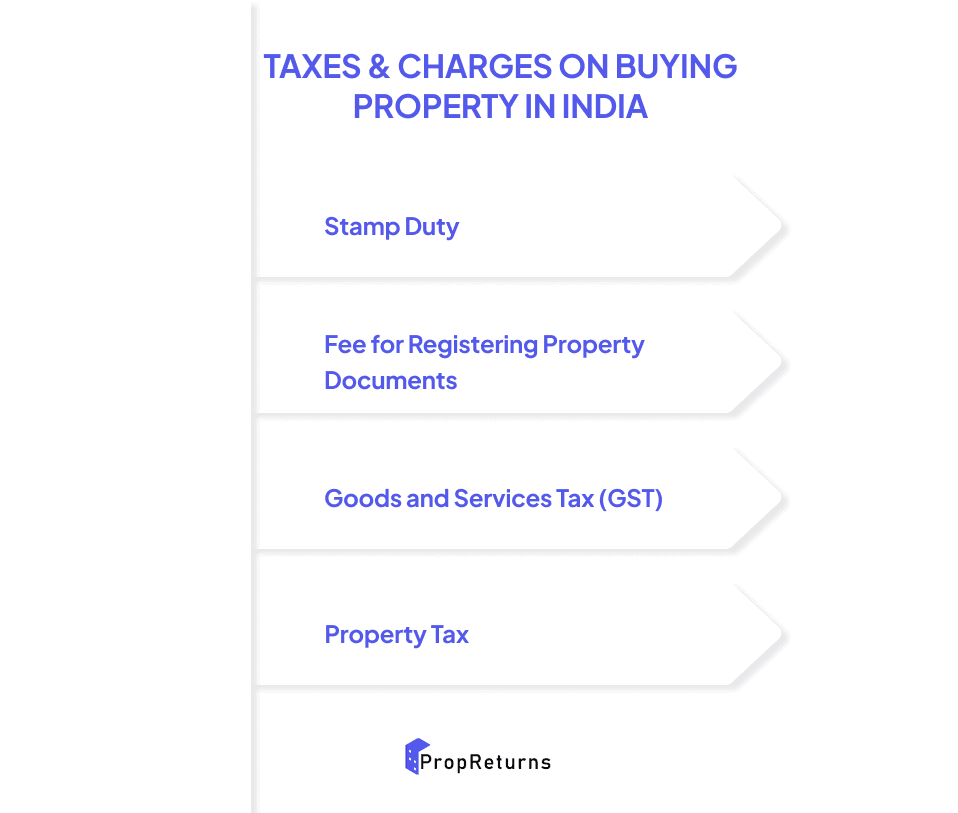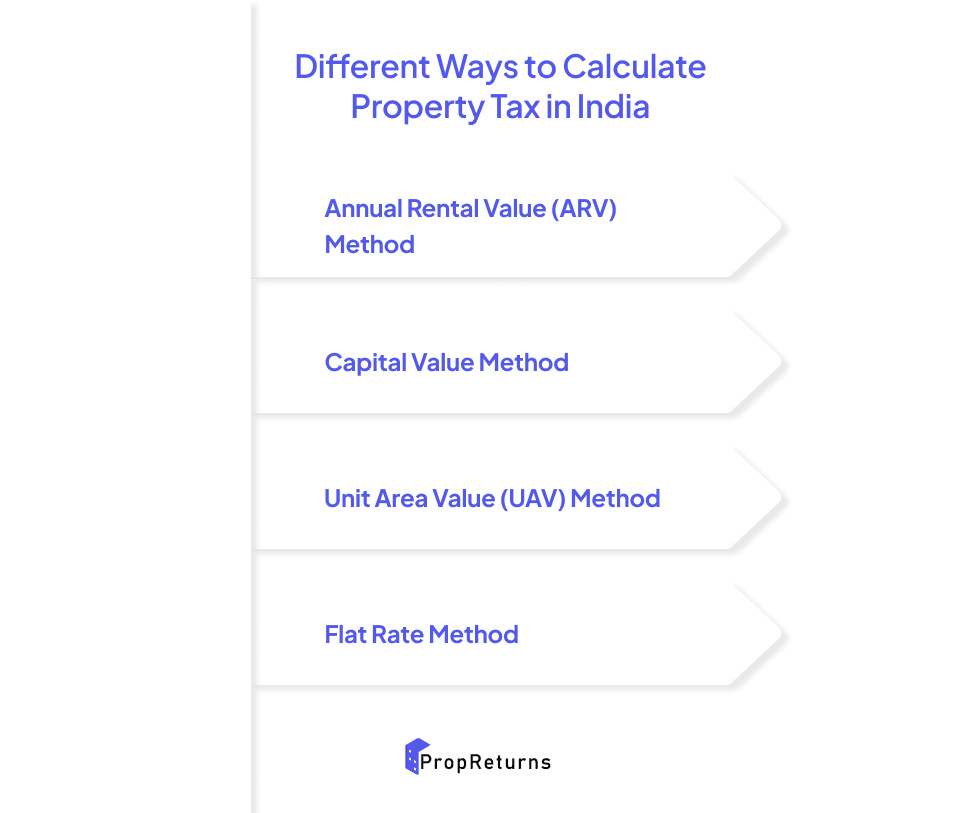You may sometimes wonder why you have to pay property tax in India, and we're here to tell you that it's not all doom and gloom! In fact, paying property tax is an essential part of contributing to the development and growth of your country. It's like being part of a big family where everyone pitches in to make sure that the place is well-maintained and the bills are paid on time.
In this article, we'll delve deeper into what property tax or house tax is and why it's important to pay it. We'll show you how property tax is calculated in India, and the exemptions and benefits associated with it.
We'll also cover the consequences of not paying Indian property taxes, as well as when you are supposed to pay it.
What is Property Tax in India?
Property tax in India is a tax levied by the government on the value of real estate property, such as land, buildings, and other immovable assets. The tax is typically based on the assessed value of the property and is paid annually by the property owner to the local municipal corporation or government authority.
Property tax is an important source of revenue for the government and plays a crucial role in the development and maintenance of infrastructure in a city or town.
Is there any Tax on Buying Property in India?
Simply put, yes, there are certain taxes and charges that need to be paid while buying property in India. Some of the common taxes and charges include:

Stamp duty: It is a tax levied by the state government on the sale deed or transfer document that is executed while transferring ownership of the property. The stamp duty rate varies from state to state.
Registration fee: This is a fee that is charged by the state government for registering property transfer documents.
Goods and Services Tax (GST): GST is applicable on under-construction properties and is levied by the central government. The rate of GST is 5% for properties priced below Rs. 45 lakhs and 1% for affordable housing.
Property tax: This is an annual tax that is levied by the local municipal corporation or government authority on the value of the property.
Apart from these taxes and charges, there may be other charges such as maintenance charges, society charges, parking charges, etc. that may need to be paid while buying a property in India. It is important for buyers to be aware of these taxes and charges and factor them in while calculating the total cost of the property.
Why do we pay Property Tax in India?
The revenue generated from property tax is used to fund various services and facilities provided by local governments, such as the maintenance of roads, street lighting, garbage collection, sewage treatment, and other civic amenities. It also helps in improving the infrastructure and quality of life in the area.
Property tax is an essential source of income for local governments as it enables them to provide necessary services to residents and improve the overall living conditions in the area. Paying property tax also helps in promoting civic responsibility among property owners and ensures that they contribute their fair share towards the development of their locality.
How Property Tax is Calculated in India?
The property tax calculation formula in India can vary depending on the state or municipality in which the property is located. However, here is a general formula that is commonly used:
Property tax = Base value of the property x Rate of tax x Age factor x Usage factor x Type of property factor
Here's a brief explanation of each of the factors:
The base value of the property: This is the estimated market value of the property, determined by the local authorities.
Rate of tax: This is the percentage of the base value that is used to calculate the tax. The rate of tax can vary depending on the location of the property and the category of the property.
Age factor: This factor takes into account the age of the property. Generally, older properties have a lower age factor and therefore a lower tax rate.
Usage factor: This factor takes into account the intended use of the property, such as residential or commercial. Different usage categories may have different tax rates.
Type of property factor: This factor takes into account the type of property, such as a flat or a bungalow. Different property types may have different tax rates.
Once these factors have been determined, you can use the property tax calculation formula which is calculated by multiplying the base value of the property by the rate of tax, age factor, usage factor, and type of property factor. The resulting amount is the property tax that is due.
What Are The Different Types of Properties in India?
In India, property tax is levied on various types of properties. The types of properties for which property tax is paid in India are as follows.
Residential Property: This includes houses, apartments, flats, and any other type of property that is used for residential purposes. For such properties, house tax in India will be levied.
Commercial Property: This includes properties that are used for commercial purposes such as shops, offices, hotels, restaurants, and other business establishments.
Industrial Property: This includes properties that are used for industrial purposes such as factories, warehouses, and manufacturing plants.
Vacant Land: This includes any land that is not being used for any purpose, whether it is residential, commercial or industrial.
What are the different Ways to Calculate Property Tax in India?
The methods of calculating property tax can vary depending on the country or region. In India, property tax is generally calculated using one of the following methods:

Annual Rental Value (ARV) Method: Under this method, the property tax is calculated based on the annual rental value of the property. The rental value is determined by the local municipal corporation or council based on factors such as location, size, and type of property.
Capital Value Method: Under this method, the property tax is calculated based on the market value of the property. The market value is determined by the local municipal corporation or council based on factors such as location, size, and type of property.
Unit Area Value (UAV) Method: Under this method, the property tax is calculated based on the built-up area of the property. The built-up area is divided into units, and a rate per unit area is fixed by the local municipal corporation or council based on factors such as location, size, and type of property.
Flat Rate Method: Under this method, a flat rate of property tax is charged irrespective of the size, location, or type of property. This method is commonly used for properties that are not easily assessable, such as vacant land.
Are there any Exemptions on Property Tax in India?
In India, certain individuals or entities may be exempted from paying property tax under certain conditions. The exemptions may vary from state to state and from municipality to municipality. However, some common exemptions from property tax in India are:
Properties owned and used by charitable organizations for charitable purposes may be exempted from property tax.
Properties owned by the government or local authorities such as schools, hospitals, and public parks may be exempted from property tax.
Agricultural land and buildings used for agricultural purposes may be exempted from property tax.
Properties that are occupied by widows, disabled persons, or persons with low income may be exempted from property tax.
Properties owned by war widows or ex-servicemen may be exempted from property tax.
Properties used for religious purposes such as temples, churches, and mosques may be exempted from property tax.
What are the Tax Benefits of Paying Property Tax In India?
Paying property tax can provide several tax benefits or savings for property owners in India. Some of the tax benefits or savings that can be availed by paying property tax are as follows.
Income Tax Deduction: Property tax paid on a residential property is allowed as a deduction under Section 24(b) of the Income Tax Act, 1961. The deduction is allowed from the GAV of the property. This deduction can be availed by the property owner while calculating their taxable income.
Capital Gains Tax: If the property is sold, the property tax paid during the ownership period can be deducted from the sale value to arrive at the capital gains tax liability. This can reduce the capital gains tax liability of the property owner.
Property Valuation: Property tax payment also serves as a record of the property's value, which can be used for future valuation purposes. This can be beneficial in case the property is sold or used as collateral for a loan.
Avoid Penalties: Non-payment of property tax can attract penalties, which can add up over time. By paying property tax on time, property owners can avoid penalties and interest charges.
Improved Property Infrastructure: The property tax collected by the local municipal corporation or council is used for improving the infrastructure of the locality. This can lead to better roads, drainage systems, and other facilities, which can enhance the value of the property in the long run.
What happens if You Don't Pay Property Tax in India?
House tax in India is a mandatory tax levied by the local government on property owners. Failure to pay property tax can result in various consequences, which may include:
Imposition of penalties: Property owners who fail to pay property tax on time may be subjected to penalties and fines. The amount of penalty varies from state to state and is typically a percentage of the outstanding tax amount.
Legal action: If property owners fail to pay property tax despite repeated reminders and notices from the local government, legal action may be initiated against them. The local government may issue a notice to the property owner, asking them to pay the tax dues within a specific time frame. Failure to comply with the notice may result in the government seizing the property or auctioning it off to recover the outstanding dues.
Disruption of services: Non-payment of property tax can also result in a disruption of services and amenities provided by the local government. This can include an interruption in water and electricity supply, garbage collection, and other essential services.
When to Pay Property Tax in India?
When to pay property tax in India is a question that most of us do not know the answer to. The due date for payment of property tax in India varies depending on the local municipality or governing body in charge of collecting the tax. Generally, property tax is payable annually, and the due date is usually set for the first quarter of the financial year, i.e., between April to June.
Conclusion
Property tax is an essential source of revenue for local municipal corporations and councils in India. It is a tax levied on various types of properties such as residential, commercial, industrial, and vacant land. Paying property tax not only fulfills the civic duty of a property owner but also provides various tax benefits and savings. It is advisable for property owners to pay their property tax on time and consult with the local municipal corporation or council for specific information regarding property tax calculation and exemptions in their area.
